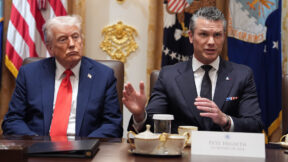BBC Calls Out Brexiteers As EU Import Checks Set To Raise UK Food Prices
BBC Newsnight host Victoria Derbyshire called out GB News host and Tory Brexiteer Jacob Rees-Mogg and former Prime Minister Boris Johnson for being “wrong” about the impact of imports on food prices from Brexit as the new paperwork regime on imports from the European Union begins Wednesday.
“It was Conservative Brexiteer Jacob Rees-Mogg who promised cheaper food after Brexit and it was former Conservative Prime Minister Boris Johnson who said there would be no extra checks on trade,” Derbyshire began. “It appears both were wrong.”
She continued: “The day after tomorrow, both post-Brexit checks begin to be brought in on certain produce coming to the country from the EU. Checks that have been delayed five times. And they will push up the domestic price of imported food. Such extra checks and charges, a move away from years of frictionless free-flowing trade, became inevitable because of the shape of the Brexit deal agreed with the EU in 2020.”
The host then introduced Economics editor Ben Chu, who delivered a special report on how the checks will impact the UK economy and who played out a clip of Johnson denying that there would be “non-tariff barriers to trade.” However, as the UK begins to differentiate it’s regulatory framework from the EU the inevitability of these barriers are coming into effect.
Chu explained beginning Wednesday, the UK will enforce import paperwork on EU animal and plant products, a post-Brexit change delayed by the government, with physical inspections from April. These measures aim to protect against biosecurity risks and diseases like foot and mouth, crucial for UK farmers’ safety.
The initiative, he said, also seeks to maintain competitiveness with the EU, which has similar checks on UK exports. However, this could lead to shortages of imports like bacon, as EU suppliers face new bureaucratic hurdles, including required certifications from vets, raising concerns about supply disruptions.
The paperwork incurs costs of £20 to £43 per consignment, contributing to an estimated annual expense of £330 million. This is expected to increase the prices of imported foods in the UK. Despite Johnson’s promises, there’s an inherent cost in establishing barriers with trading partners, including non-tariff barriers, which were previously non-existent.




